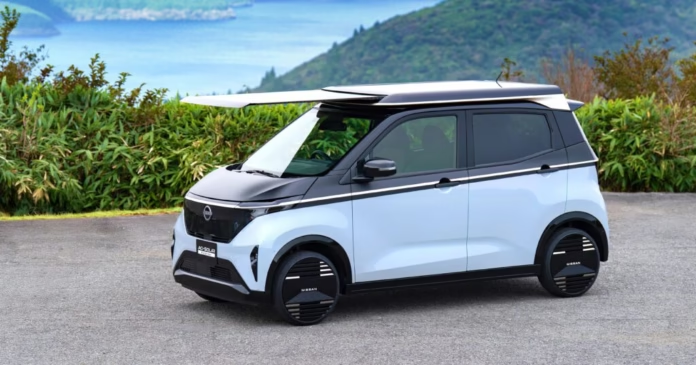Nissan has unveiled its Ao-Solar Extender, a prototype solar power generation system installed on the Nissan Sakura, Japan’s best-selling electric vehicle (EV). This innovative system aims to generate sufficient solar electricity to power the vehicle for up to 3,000 kilometers annually, significantly reducing reliance on grid charging. The Ao-Solar Extender is a roof-mounted system that works both when the vehicle is in motion and stationary, enhancing EV convenience and sustainability.
Innovative Solar Charging for Electric Vehicles
The Ao-Solar Extender consists of a fixed solar panel mounted on the roof with an additional extendable panel that deploys when the vehicle is parked. This setup can produce about 500 watts of power, increasing the solar surface area substantially. The extended panel also serves practical purposes like shading the cabin, thus lowering the need for air conditioning. Nissan optimized the system to minimize aerodynamic drag and maintain the Sakura’s sleek design.
Reducing Charging Barriers and Emergency Uses
The Nissan Sakura has been the top EV in Japan for three years running from 2022 to 2024, with most drivers covering short distances such as errands or school runs. For such use cases, the Ao-Solar Extender could nearly eliminate the need for conventional charging by supplementing the battery through solar power. Additionally, this system acts as a reliable emergency power source during natural disasters, offering safety benefits amidst increasing climate-related events.
Origin and Future Availability
The solar extender concept arose from Nissan’s internal 2021 idea contest and reflects the company’s commitment to innovative, eco-friendly EV technologies. Nissan plans to launch the system commercially but has yet to announce a timeline. The Ao-Solar Extender will be displayed at the Japan Mobility Show 2025 as part of Tokyo Future Tour’s City Life zone, emphasizing Nissan’s leadership in sustainable mobility.
Solar Power in EVs
Globally, integrating solar panels with electric vehicles is emerging as a sustainable solution to mitigate range anxiety and reduce emissions from charging. By harnessing renewable solar energy, EVs can extend their driving range while lowering carbon footprints. Nissan’s Ao-Solar Extender exemplifies advancements in this field, focusing on practical applications for daily urban commuting, especially in Japan’s concentrated kei car market.
Nissan’s Ao-Solar Extender represents a promising step toward environmentally conscious transportation. By supplying solar-generated electricity directly to a popular kei EV, Nissan aims to enhance customer convenience, reduce charging infrastructure load, and promote green energy use.







